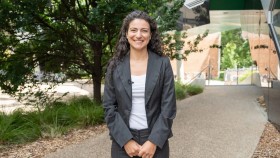Do you have imposter syndrome?
“Hello, I’m Not-Clever-Enough-To-Have-A-PhD. What’s your name?”
“I’m Only-An-Honours-Student. Pleased to meet you.”
I’m here to interview ‘Not-Clever-Enough-To-Have-A-PhD’. Her real name is Dr Jennie Mallela, and of course she’s clever enough to have a PhD.
To the outside world, Dr Mallela from the ANU Research Schools of Biology and Earth Sciences, is a certified ‘Superstar of STEM’. On the inside, however, she has, like so many of us, been a victim of imposter syndrome.
It was at a workshop with her fellow Superstars where Dr Mallela first spoke this other name out loud. The Superstars of STEM program aims to recognise excellence in female STEM leaders. So here was a room of 60 excellent women, with more doctoral degrees, research grants, and academic tenures than you could poke an undergraduate finger at.
“We did this exercise where we walked around the room and introduced each other as our imposter syndrome,” Dr Mallela says.
“All these women were recognised as experts their field. And yet all of us felt like we weren’t good enough for various reasons.”
“By the time you’d gone around the room and been introduced to 59 other women by their imposter syndrome name, you realised how ridiculous it is. You’re looking at them and thinking, ‘There is no way that could possibly apply to you.’”
So how is it that you can be an actual superstar and still feel like an imposter?
Associate Professor Bruce Christensen, clinical psychologist at the ANU Research School of Psychology, says imposter syndrome is a common experience among his clients, across a range of fields.
“They feel like a fraud, or they feel like their achievements are over-estimated or over-evaluated in ways that aren’t commensurate with their actual abilities.”
He says self-doubt and alienation are at the root of imposter syndrome, not capability.
This is why, when someone first suggested to Dr Mallela that she should apply to be a Superstar of STEM, her response was: “I don’t really think I’m superstar material.”
Dr Mallela has three degrees, a decade-long research career in environmental science and has been awarded multiple post-doctoral scholarships. She is a recipient of the prestigious Discovery Early Career Researcher Award of the Australian Research Council. She has six areas of expertise listed on her academic profile, and her work has taken her all over the world.
“I think a really big part of it was actually, even when I had my PhD, I didn’t feel particularly smart. I thought I’d just got lucky,” Dr Mallela reflects.
“Honestly, it’s probably taken me until about now to be comfortable saying, ‘I’ve worked really hard, it’s not just luck.’
“I’m learning to blow my own trumpet.”
I am at a very different stage in my career. I am an Honours student, and have just started collecting data from my first ever individually designed and constructed research experiment.
I ask myself almost daily, ‘Am I a real researcher now?’ When actually, I just feel like a child playing dress-ups.
Speaking to Dr Mallela, I realise that despite her career being light-years ahead of mine, this is what actually connects us. If, in her past, she once felt like me, then maybe, in my future, I can be like her. A superstar.
A sense of ‘belonging’ is what’s missing for the person suffering from imposter syndrome, Associate Professor Christensen suggests: “Belonging is the bridge between the environment we’re in and the skills we have.”
Being able to identify with Dr Mallela’s experience makes that bridge stronger. I might still be Only-An-Honours-Student, but right now, that’s exactly where I should be.
“Now, when imposter syndrome sneaks up on me, I remind myself that many of us suffer from cracks in our confidence,” Dr Mallela says. “I recognise it and then dismiss it.”
“If we all admit we suffer from imposter syndrome every now and then, then perhaps it won’t hold us back.”












